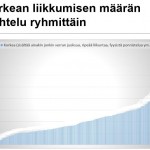The recommendations for physical activity in early childhood have been based largely on scientific justification. The articles for the Scientific justification for the recommendations for physical activity in early childhood (2016, Ministry of Education and Culture 2016:22) have just been published. The Orientation project results and insight have been a major contributor in this process, see:
Laukkanen, A., Määttä, S., Reunamo, J., Roos, E., Soini, A. and Mäki, P. Perheen tärkeä rooli [The important role of the family], p. 22-26.
Reunamo, J. Lapsilähtöinen toimintakulttuuri edellyttää lapsen kuuntelua [Child-initiated action culture requires listening the child], p. 27-31.
Iivonen, S., Laukkanen A., Haapala, A. and Reunamo, J. Motoristen taitojen kehitys [The development of motoric skills], p. 32-37.
Soini, A., Laukkanen, A., Mäki, P. and Reunamo, J. Fyysistä aktiivisuutta ja liikkumista edistävä ympäristö [An environment that enhances physical activity], p. 44-48.
Kyhälä, A-L. and Soini, A. Organisoitu liikunta [Organized excercise], p. 49-53.
Reunamo, J. and Kyhälä, A-L. Liikkuminen varhaiskasvatuspäivän osana [Physical activity as part of everyday activities in early childhood education], p. 54-58.
Hopefully the articles will be translated in English as soon as possible!

